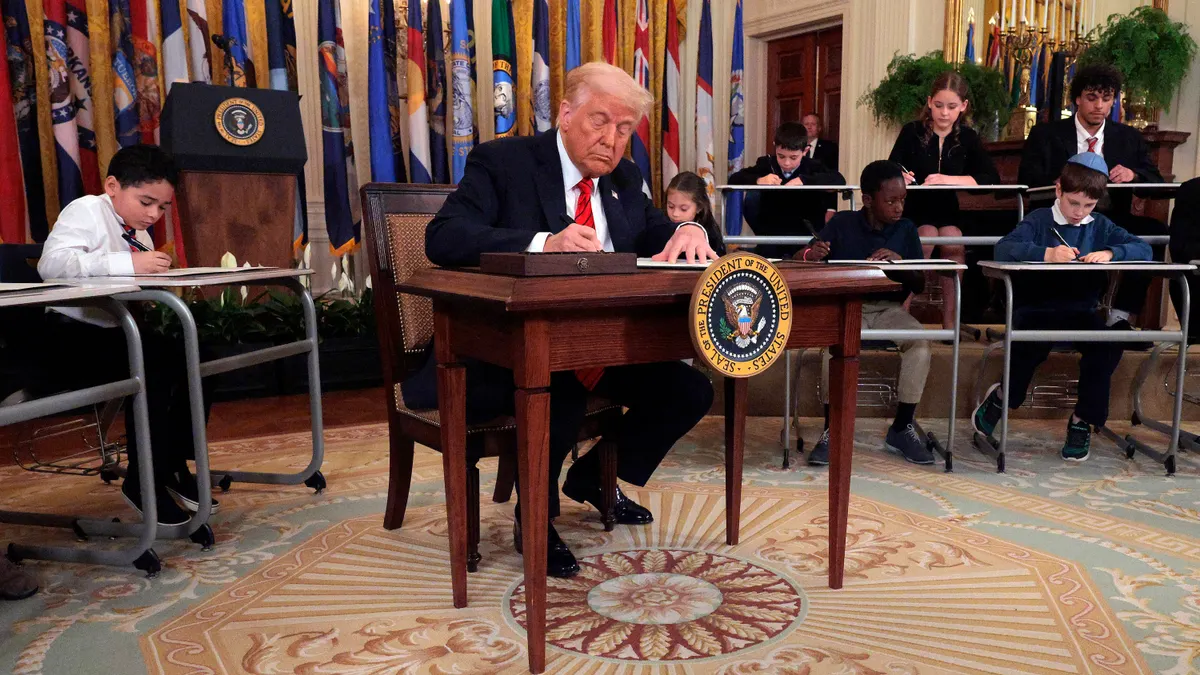A coalition of disability rights groups is raising concerns about states and districts waiving K-12 accountability and assessment requirements, saying these standards help set high expectations for all students, including those receiving special education services.
In a letter last month to U.S. Education Secretary Linda McMahon, the coalition — made up of 24 organizations including the Autism Society of America and the National Center for Learning Disabilities — urged the U.S. Department of Education to deny any state or district requests to waive accountability and assessment requirements under the Elementary and Secondary Education Act.
"We advocate for high expectations for children with disabilities under these and other laws," the letter said, referring to ESEA, the Individuals with Disabilities Education Act, Section 504 of the Rehabilitation Act and the Americans with Disabilities Act.
The coalition also protested any moves to consolidate or "block grant" federal education funds, which it said requires approval from Congress.
The Education Department this summer called on states to use existing statutory flexibilities under ESEA to seek waivers from what it said were "burdensome statutory and regulatory provisions."
That guidance to states encouraged the exploration of piloting an "innovative assessment system" with the goal of scaling up the practices statewide. Those approaches could include competency-based assessments, instructionally embedded assessments, interim assessments and cumulative year-end assessments, the Education Department letter to state education leaders said.
That letter also recommended that states consider flexibilities already allowed for certain federal funds. It listed areas off-limits for waivers, including civil rights requirements, the supplanting of federal funds, and maintenance of effort rules for special education funding.
As of Oct. 8, only Iowa has submitted a formal waiver request since the Education Department's letter was issued in July, according to a department spokesperson. The Iowa proposal seeks to align the use of funds under multiple federal programs with the state's priority areas. There are about 1,400 different funding streams across 325 school districts for nine different ESEA programs, the proposal said.
The state is not asking for ESEA assessment waivers.
In an op-ed published in The Hill on March 19, Iowa Gov. Kim Reynolds said, "prescriptive requirements prevent states from scaling innovative programs." Reynolds added that "by splitting the dollars into so many different funding streams," ESEA leads to "small-dollar investments that fail to move the needle for students or teachers."
Limits on alternate assessments
ESEA — a decades-old law last updated by Congress in 2015 — details statewide K-12 accountability and assessment requirements, among other provisions. The requirements include administering annual statewide assessments in reading and math for students in grades 3-8 and one time in high school. States are responsible for designing these tests.
ESEA also requires states to limit the use of alternate assessments based on alternate academic achievement standards given to students with the most significant cognitive disabilities. Some career, college and military opportunities after high school can be limited for students who take alternate assessments.
No more than 1% of all students in the grades assessed in a state should take alternate assessments. The cap ensures that students with disabilities aren't inappropriately assigned to take alternate assessments. However, the Education Department allows states to request waivers to exceed this cap on an annual basis.
During the 2024-25 school year, 11 waivers from states were granted and 12 were denied, according to an analysis by The Advocacy Institute. Multi-year data shows progress among states in reducing participation in alternate assessments. The number of states below the 1% cap doubled from 2016-17 to 2023-24, and the number of states over a 1.3% participation rate decreased from 16 to nine states in that same period, according to data from the Education Department.
The coalition of disability rights organizations said it remains concerned that many states are out of compliance with the 1% cap, leading to thousands of students being inappropriately assessed with alternate assessments.
High standards ‘not changing’
ESEA assessment flexibilities and potential reforms have been addressed by past presidential administrations. The Education Department under the Biden administration encouraged states to explore innovative assessment approaches. And in spring 2020, under the first Trump administration, all states automatically received ESEA assessment and accountability waivers from the Education Department due to the difficulty of administering tests at the height of the COVID-19 pandemic.
Reforms to standardized assessments that drive student achievement were a topic of a panel discussion at the Sept. 18 Reagan Institute Summit on Education in Washington, D.C. Panelists talked about the need for improving state assessment systems by potentially including career and technical education skills in high-stakes tests, through better alignment of state and local assessments, and by providing more transparency to students and families.
"I think for a state, accountability and accountability systems might be the most important lever that we have to drive academic results for kids in systems and schools," said Cade Brumley, Louisiana's superintendent of education.
Several speakers said that while they welcome state assessment flexibilities from the federal government, they don't anticipate abandoning state assessment systems.
Penny Schwinn, chief strategist to McMahon at the Education Department and a former education commissioner in Tennessee, clarified the agency's stance on the issue.
"The secretary's been very clear about this,” Schwinn said. “We're holding a high standard for student achievement, and students in the country are taking a standardized test so people in this country, especially families, know how their children are doing, period, bottom line. That's not changing.”







 Dive Awards
Dive Awards














